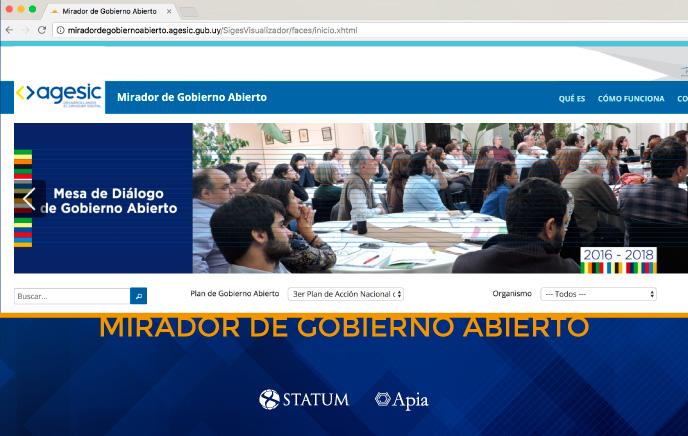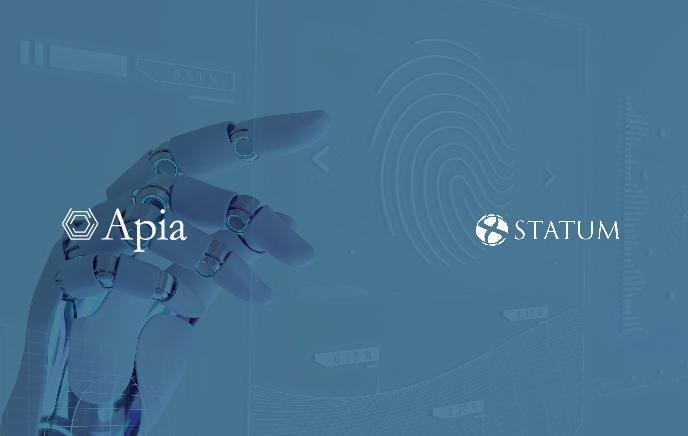Mirador de Gobierno Abierto
Resumen:
Desde mediados de febrero de 2017 está disponible el Mirador de Gobierno Abierto, una herramienta generada para conocer los compromisos asumidos por nuestro país en los Planes de Acción Nacionales de Gobierno Abierto y seguir el avance del cumplimiento de sus metas paso a paso.
Información:
En el marco del compromiso del país con la Alianza para el Gobierno Abierto (OGP, por sus siglas en inglés) y en concordancia además con los valores de cercanía y descentralización promovidos, Uruguay ha creado el 3er Plan de Acción de Gobierno Abierto.
El Plan es impulsado por Presidencia de la República y desarrollado por un grupo de trabajo integrado por representantes de la Oficina de Planeamiento y Presupuesto (OPP), el Ministerio de Economía y Finanzas (MEF), el Ministerio de Relaciones Exteriores (MRREE), el Instituto Nacional de Estadística (INE), la Unidad de Acceso a la Información Pública (UAIP), el Instituto de Ciencia Política de la Facultad de Ciencias Sociales de la UDELAR y organizaciones de la sociedad civil (Red de Gobierno Abierto) y coordinado por AGESIC.
El portal comprende secciones divididas en categorías temáticas y específicas referentes al gobierno abierto, además de un buscador para facilitar el acceso a los temas de interés particular.
Para facilitar el acceso a la información, las iniciativas incluyen una descripción, la institución responsable, sus plazos, metas y estados, así como los grados de avance general de cada compromiso e información de contacto. De esta manera, la ciudadanía puede monitorear el avance de las acciones e interiorizarse con otras iniciativas en diversos asuntos de carácter nacional o departamental.
Algunos de los datos de relevancia a los que la sociedad civil podrá acceder desde el Mirador de la Agenda Digital, serán los siguientes:
- Datos abiertos del Instituto Nacional de Colonización (fecha tentativa de publicación: 29/06/2018): El objetivo es transparentar y publicar -en formato de datos abiertos- la información sobre los ofrecimientos de tierra que recibe el organismo y, por otro lado, las compras de tierra que efectúa. Migrará la información histórica de los ofrecimientos y compras desde el año 2010 al nuevo sistema del instituto y comenzará a registrar en él todas estas operaciones.
- Transparencia de información estadística del Poder Judicial (fecha estimada de publicación: 29/06/2018): El ciudadano podrá acceder a bases de micro-datos correspondientes a los informes estadísticos del Poder Judicial, en cuanto estén vinculados a procesos concluidos en el ámbito “Penal, Adolescente y Faltas”. También se podrán geo-referenciar los datos de gestiones iniciados en materia de violencia doméstica, e información correspondiente a procesos concluidos en materia de Faltas, este último en el caso del Departamento de Montevideo.
- Reclamos y consultas online en la URSEC (fecha prevista de publicación: 31/07/2018): Se pondrá a disposición de la ciudadanía una herramienta capaz de canalizar consultas y reclamos a la URSEC, generando un registro para el seguimiento, la centralización y la mejor gestión de consultas, viabilizando además la elaboración de informes estadísticos sobre las demandas ciudadanas a la unidad.
- Apertura y publicación de la normativa nacional en formato de datos abiertos (fecha tentativa: 29/06/2018): El IMPO (Dirección Nacional de Impresiones y Publicaciones Oficiales) detectó la necesidad de adaptar la promoción del conocimiento de la sociedad a los adelantos tecnológicos, teniendo en cuenta el marco normativo y regulatorio vigente. Por lo tanto, habilitará el acceso, en formato de información abierta, al material extractado de bases de datos jurídicas y normativas, que son gestionadas por la propia organización.
- Rendición de Cuentas en Materia de Acceso a la Información Pública (fecha estimada de publicación: 31/12/2018): Se encargará de la divulgación en línea de información relativa al estado de cumplimiento de la Ley de Acceso a la Información Pública (Ley 18.381) por parte de los sujetos obligados. Impulsará las reformas normativas necesarias para viabilizar el uso del Sistema de Acceso a la Información Pública en la Administración Central, así como para facilitar la presentación de las solicitudes de acceso por medios electrónicos.
¿Quién Controla Qué?
- Catálogo en Línea de las funciones y competencias de control existentes en los organismos del Estado (fecha estimada de publicación: 29/06/2018): Se implementará un primer catálogo en línea que presentará información relativa a las funciones y las competencias de control, existentes en los organismos del Estado. Buscará facilitar a la ciudadanía información sobre sus cometidos, sujetos obligados, ámbitos de actuación, procedimientos, normativa, cómo ejercer el derecho, hacer los trámites de denuncias o consultas y las instituciones vinculadas a ellas.
Fuente de información:
Mirador de Gobierno Abierto
Desde mediados de febrero de 2017 está disponible el Mirador de Gobierno Abierto, una herramienta generada para conocer los compromisos asumidos por nuestro país en los Planes de Acción Nacionales de Gobierno Abierto y seguir el avance del cumplimiento de sus metas paso a paso.
Información:
En el marco del compromiso del país con la Alianza para el Gobierno Abierto (OGP, por sus siglas en inglés) y en concordancia además con los valores de cercanía y descentralización promovidos, Uruguay ha creado el 3er Plan de Acción de Gobierno Abierto.
El Plan es impulsado por Presidencia de la República y desarrollado por un grupo de trabajo integrado por representantes de la Oficina de Planeamiento y Presupuesto (OPP), el Ministerio de Economía y Finanzas (MEF), el Ministerio de Relaciones Exteriores (MRREE), el Instituto Nacional de Estadística (INE), la Unidad de Acceso a la Información Pública (UAIP), el Instituto de Ciencia Política de la Facultad de Ciencias Sociales de la UDELAR y organizaciones de la sociedad civil (Red de Gobierno Abierto) y coordinado por AGESIC.
El portal comprende secciones divididas en categorías temáticas y específicas referentes al gobierno abierto, además de un buscador para facilitar el acceso a los temas de interés particular.
Para facilitar el acceso a la información, las iniciativas incluyen una descripción, la institución responsable, sus plazos, metas y estados, así como los grados de avance general de cada compromiso e información de contacto. De esta manera, la ciudadanía puede monitorear el avance de las acciones e interiorizarse con otras iniciativas en diversos asuntos de carácter nacional o departamental.
Algunos de los datos de relevancia a los que la sociedad civil podrá acceder desde el Mirador de la Agenda Digital, serán los siguientes:
- Datos abiertos del Instituto Nacional de Colonización (fecha tentativa de publicación: 29/06/2018): El objetivo es transparentar y publicar -en formato de datos abiertos- la información sobre los ofrecimientos de tierra que recibe el organismo y, por otro lado, las compras de tierra que efectúa. Migrará la información histórica de los ofrecimientos y compras desde el año 2010 al nuevo sistema del instituto y comenzará a registrar en él todas estas operaciones.
- Transparencia de información estadística del Poder Judicial (fecha estimada de publicación: 29/06/2018): El ciudadano podrá acceder a bases de micro-datos correspondientes a los informes estadísticos del Poder Judicial, en cuanto estén vinculados a procesos concluidos en el ámbito “Penal, Adolescente y Faltas”. También se podrán geo-referenciar los datos de gestiones iniciados en materia de violencia doméstica, e información correspondiente a procesos concluidos en materia de Faltas, este último en el caso del Departamento de Montevideo.
- Reclamos y consultas online en la URSEC (fecha prevista de publicación: 31/07/2018): Se pondrá a disposición de la ciudadanía una herramienta capaz de canalizar consultas y reclamos a la URSEC, generando un registro para el seguimiento, la centralización y la mejor gestión de consultas, viabilizando además la elaboración de informes estadísticos sobre las demandas ciudadanas a la unidad.
- Apertura y publicación de la normativa nacional en formato de datos abiertos (fecha tentativa: 29/06/2018): El IMPO (Dirección Nacional de Impresiones y Publicaciones Oficiales) detectó la necesidad de adaptar la promoción del conocimiento de la sociedad a los adelantos tecnológicos, teniendo en cuenta el marco normativo y regulatorio vigente. Por lo tanto, habilitará el acceso, en formato de información abierta, al material extractado de bases de datos jurídicas y normativas, que son gestionadas por la propia organización.
- Rendición de Cuentas en Materia de Acceso a la Información Pública (fecha estimada de publicación: 31/12/2018): Se encargará de la divulgación en línea de información relativa al estado de cumplimiento de la Ley de Acceso a la Información Pública (Ley 18.381) por parte de los sujetos obligados. Impulsará las reformas normativas necesarias para viabilizar el uso del Sistema de Acceso a la Información Pública en la Administración Central, así como para facilitar la presentación de las solicitudes de acceso por medios electrónicos.
¿Quién Controla Qué?
- Catálogo en Línea de las funciones y competencias de control existentes en los organismos del Estado (fecha estimada de publicación: 29/06/2018): Se implementará un primer catálogo en línea que presentará información relativa a las funciones y las competencias de control, existentes en los organismos del Estado. Buscará facilitar a la ciudadanía información sobre sus cometidos, sujetos obligados, ámbitos de actuación, procedimientos, normativa, cómo ejercer el derecho, hacer los trámites de denuncias o consultas y las instituciones vinculadas a ellas.
Fuente de información:
Mirador de Gobierno Abierto





Comentarios (0)
Deja un comentario